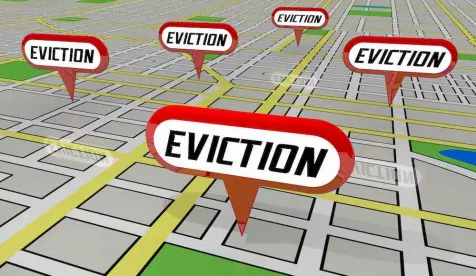On May 5, 2021, the United States District Court for the District of Columbia (“DC Court”) vacated a nationwide eviction moratorium order issued by the Centers for Disease Control (“CDC”) to help mitigate the spread of COVID-19 in Alabama Association of Realtors, et al. v. United States Department of Health and Human Services, et al.1 (the “Decision”). The DC Court found that the CDC exceeded its authority in issuing such moratorium on nationwide evictions of rental properties and that the CDC Order should be set aside. The Decision was immediately appealed by the Justice Department on behalf of the CDC and the ruling has been stayed pending such appeal.
The eviction moratorium set forth in the Temporary Halt in Residential Evictions to Prevent the Further Spread of COVID-192 (the “CDC Order”) was issued by the CDC on September 4, 2020 and subsequently extended to expire on July 30, 2021.3 The CDC Order was issued by the CDC to combat the spread of coronavirus by allowing tenants that met certain financial criteria who were having difficulty paying full contractual rent during the pandemic to remain in their homes, rather than be forced into homeless shelters or similar crowded living spaces.4 Landlords and property owners who violated the CDC Order could be subject to financial penalties and/or criminal penalties.5 While several states, including New York and California, and local governments have adopted their own eviction moratoriums in response to the coronavirus pandemic, the CDC Order provided tenants who had difficulty paying rent during the pandemic across the country with a defense against evictions. The Decision of the DC Court does not impact such state or local moratoriums.
The plaintiffs,6 which included residential property management companies, brought the action in November 2020 because they believed the eviction moratorium exceeded the CDC’s statutory authority and challenged the CDC Order on a number of statutory and constitutional grounds. They filed a Motion for Expedited Summary Judgment with the DC Court. The CDC and the other defendants,7 represented in the action by the Department of Justice, filed a Motion for Summary Judgment and Partial Motion to Dismiss.
The CDC Order was issued by the CDC under Section 361 of the Public Health Services Act, which grants the CDC authority to take measures to stop the spread of communicable diseases in the United States. The Decision provided that “The question for the Court is a narrow one: Does the Public Health Service Act grant the CDC the legal authority to impose a nationwide eviction moratorium? It does not.”8 In coming to such decision, Judge Friedrich applied the two-step administrative law analysis from Chevron U.S.A. Inc. v. Natural Resources Defense Council, Inc. to determine whether or not an administrative agency should be given judicial deference on its interpretation of a statute promulgated by Congress.
The first step in such Chevron analysis is whether or not “Congress has directly spoken to the precise question at issue.”9 If the statute is found to be ambiguous by a court, then the court will apply the additional step in the analysis, which evaluates whether the agency’s interpretation of the statute is reasonable, even if the court would have chosen an alternative interpretation. But the DC Court did not reach the second step and found that the Public Health Services Act, by its plain terms, did not evidence congressional intent to provide the CDC with authority to issue such a nationwide eviction moratorium. Judge Friedrich wrote that the “Court must apply the ‘ordinary tools of the judicial craft,’ including canons of construction. These canons confirm what the plain text reveals. The Secretary’s authority does not extent [sic] as far as the Department contends.”10
Judge Friedrich issued the Decision vacating the CDC Order nationwide, denying the government’s request that she narrow the effect of the Decision and limit any vacating order to the plaintiffs with standing before the DC Court. Prior to the Decision, there had been several challenges to the CDC Order, some which also found that the CDC exceeded their authority in issuing the CDC Order but on other grounds.11 Earlier this year, the United States District Court in the Eastern District of Texas found that the CDC Order exceeded the constitutional authority granted to the CDC,12 rejecting the government’s argument that the CDC Order was within the legislative powers granted to Congress under the interstate commerce clause of the U.S. Constitution.13 But unlike some prior decisions where the courts have limited the scope of their rulings to apply only to the parties involved in the particular lawsuits before them, Judge Friedrich found that any such limitation would be “at odds with settled precedent.”14
The impact of the Decision on tenants and landlords across the country is not yet clear. Immediately following the Decision, the Justice Department filed a notice of appeal and request for a stay of decision until the appeal is decided. The moratorium remains in place for now after the Decision was stayed by Judge Friedrich pending such appeal. We will continue to monitor and keep you apprised of further developments, if any, in this case.
1 See Case No. 1 : 20-cv-0337 in the United States District Court for the District of Columbia.
2 85 Fed. Reg. 55, 292 (Sept. 4, 2020).
3 86 Fed. Reg. 16,731 (Mar. 31, 2021).
4 The CDC Order provides that “a landlord, owner of a residential property, or other person with a legal right to pursue eviction or possessory action shall not evict any covered person from any residential property in any jurisdiction to which this Order applies during the effective period of the Order.” 85 Fed. Reg. 55, 292 (Sept. 4, 2020).
5 86 Fed. Reg. at 8,025.
6 The plaintiffs in the action were Danny Fordham, Robert Gilstrap, the corporate entities they use to manage rental properties (Fordham & Associates, LLC, H.E. Cauthen Land and Development LLC, and Title One Management LLC) and two trade associations (the Alabama and Georgia Associations of Realtors).
7 The other defendants were the United States Department of Health and Human Services, the United States Department of Justice, Alex M. Azar, II, William P. Barr, Robert R. Redfield and Nina B. Witkofsky.
8 Case No. 1 : 20-cv-0337 in the United States District Court for the District of Columbia.
9 Case No. 1 : 20-cv-0337 in the United States District Court for the District of Columbia.
10 Case No. 1 : 20-cv-0337 in the United States District Court for the District of Columbia quoting Mozilla Corp. v. Fed. Commc’ns Comm’n, 940 F. 3d 1, 20 (D.C. Cir. 2019) and ArQule, Inc. v. Kappos, 793 F. Supp. 2d 214, 219-20 (D.D.C. 2011).
11 Case No. 1 : 20-cv-0337 in the United States District Court for the District of Columbia.
12 See Case No. 6:20-cv-00564 in United States District Court for the Eastern District of Texas.
13 Steven Herman and Jessica Wong, Cadwalader Clients & Friends Memo, COVID-19 Update: Federal Eviction Moratorium Struck Down, March 5, 2021, https://www.cadwalader.com/resources/clients-friends-memos/covid-19-update--federal-eviction-moratorium-struck-down.
14 Case No. 1 : 20-cv-0337 in the United States District Court for the District of Columbia quoting O.A. v. Trump, 404 F. Supp. 3d 109, 153 (D.D.C. 2019).





 />i
/>i
